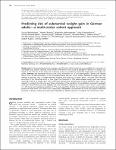Predicting risk of substantial weight gain in German adults—a multi-center cohort approach
Bachlechner, Ursula
Boeing, Heiner
Haftenberger, Marjolein
Schienkiewitz, Anja
Scheidt-Nave, Christa
Vogt, Susanne
Thorand, Barbara
Schipf, Sabine
Ittermann, Till
Völzke, Henry
Nöthlings, Ute
Neamat-Allah, Jasmine
Greiser, Karin-Halina
Kaaks, Rudolf
Steffen, Annika
Background: A risk-targeted prevention strategy may efficiently utilize limited resources available for prevention of overweight and obesity. Likewise, more efficient intervention trials could be designed if selection of subjects was based on risk. The aim of the study was to develop a risk score predicting substantial weight gain among German adults. Methods: We developed the risk score using information on 15 socio-demographic, dietary and lifestyle factors from 32 204 participants of five population-based German cohort studies. Substantial weight gain was defined as gaining ≥10% of weight between baseline and follow-up (>6 years apart). The cases were censored according to the theoretical point in time when the threshold of 10% baseline-based weight gain was crossed assuming linearity of weight gain. Beta coefficients derived from proportional hazards regression were used as weights to compute the risk score as a linear combination of the predictors. Cross-validation was used to evaluate the score’s discriminatory accuracy. Results: The cross-validated c index (95% CI) was 0.71 (0.67–0.75). A cutoff value of ≥475 score points yielded a sensitivity of 71% and a specificity of 63%. The corresponding positive and negative predictive values were 10.4% and 97.6%, respectively. Conclusions: The proposed risk score may support healthcare providers in decision making and referral and facilitate an efficient selection of subjects into intervention trials.
No license information

